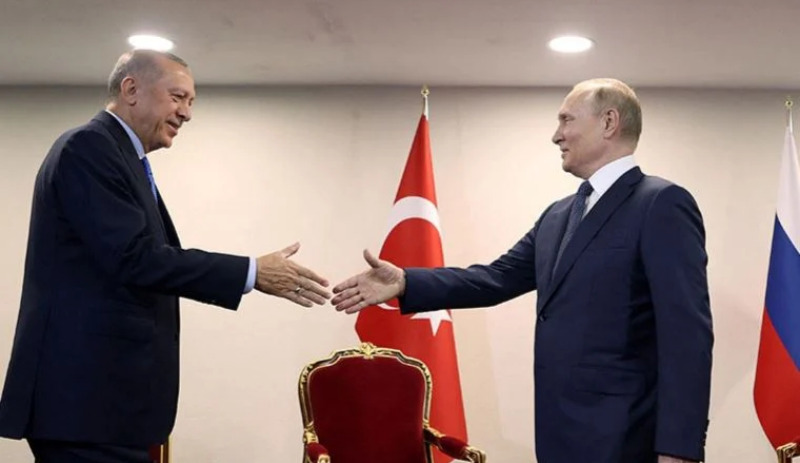“The return of Crimea to Ukraine, of which it is an inseparable part, is essentially a requirement of international law.” In itself, that striking comment from Turkish President Recep Tayyip Erdogan, delivered via a video link at the Crimea Platform Summit last month, would not have surprised anyone who follows Turkish-Russian relations closely.
Yet it was evidence of more than Erdogan’s complex juggle between his support for Ukrainian sovereignty and his refusal to join sanctions against Russia. It was a pointer to opportunities that Turkey is eyeing to push the envelope in its ties with Russia, at a time when the Kremlin is bogged down in Ukraine.
Whether in Syria or the South Caucasus, Ankara is getting ready to fill the gap as Moscow’s influence appears poised to decline.
Following Russia’s aggression against Ukraine, Turkey has played the role of an intermediary, as demonstrated in the deal it brokered in July, with help from the United Nations, for Ukrainian grain ships to set sail from Odesa. Its trade ties with Russia are booming. Yet Erdogan has remained consistent in backing Kyiv, including in Crimea, the historic home of Crimean Tatars (a community that sees Turkey as a kin state). Turkey’s supply of Bayraktar drones to the Ukrainian armed forces remains Ankara’s most potent symbol of military support to Kyiv.
Turkey has felt threatened by Russian expansion into the Black Sea since the war in Georgia in 2008. Step by step, Moscow has asserted control over buffer states whose emergence in the early 1990s had facilitated an unprecedented rapprochement between Russia and Turkey.
Ankara’s own sense of vulnerability, combined with a deep-seated distrust of Western allies has made it seek conciliation with its giant imperialist-minded neighbour, instead of a face-off. At the same time, though, Turkey has cultivated alliances with other Black Sea states fearful of Russian revanchism such as Ukraine, Georgia, Azerbaijan, Romania and Moldova.
It is important to recognise that the country now appears set to go a step further.
Take northern Syria, for example. Since May, Erdogan has been calling for an operation to clear the People’s Protection Units (YPG) from the areas of Tal Rifaat and Manbij. Turkish forces and their allies from the Syrian National Army have increased the pressure on the Kurdish fighters along the contact line west of the Euphrates as well as around Kobani, Ain Issa and Tal Tamer to the east. In tandem, Erdogan is carrying out a vigorous diplomatic effort to get Russia as well as Iran on board.
Syria was the focus of his three-way summit with Russian President Vladimir Putin and Iranian President Ebrahim Raisi in Tehran on July 21, as well as Erdogan’s meeting with Putin in Sochi on August 5. To get Russia and Iran to sign off on his plans for an all-out offensive, he is dangling the prospect of restoring ties with the government of Syria’s Bashar al-Assad as a quid pro quo. However, should Putin refuse to endorse a new operation, it is not inconceivable that Turkish forces will make a unilateral move.
Another scenario where Turkey is making headway, at Russia’s expense, is the South Caucasus. In July, Ankara and Yerevan agreed to open their border, sealed off to third-country nationals since the early 1990s, and allow cargo flights to use each other’s airfields. Turkish and Armenian diplomats are negotiating the establishment of diplomatic ties.
Fear of Turkey has been a key reason for Armenia’s alignment with Russia in terms of foreign and security policy. But after Azerbaijan defeated the Armenians in Nagorno-Karabakh back in November 2020 with Turkish help, the value of that alliance with Russia receded.
After all, Moscow stayed neutral and let Armenian forces fend for themselves. Now, the Armenian leadership is pragmatically exploring an opening with Turkey which may deliver economic and strategic benefits.
The common thread across Syria and Armenia is that Turkey is methodically turfing out Russia from its neighbourhood and regions where Moscow has held a strategic edge over its geopolitical rivals in recent years.
Of course, Moscow is capable of spoiling such efforts. Distracted though they are, the Russians still have friends in the Iranians and Assad in Syria as well as a partnership of convenience with the YPG.
Russia also retains a 2,000-strong peacekeeping contingent in Karabakh that could play a critical role in shaping the conflict there. Moscow has some economic leverage over Yerevan too: Bilateral trade has soared as Armenia has become a backdoor route for Russia to bypass Western sanctions. On Monday, fresh clashes broke out between Azerbaijan and Armenia, though a ceasefire was subsequently announced.
Yet anyone who thinks that the war in Ukraine is, at the end of the day, a conflict involving Moscow, Kyiv and Western capitals would do well to look further afield. If Russia’s expansion is stopped, another nation is ready to spread its diplomatic influence.
By: Dimitar Bechev
Source: Al Jazeera



